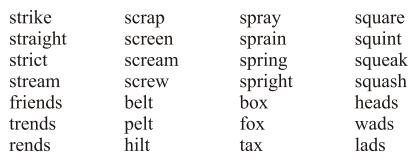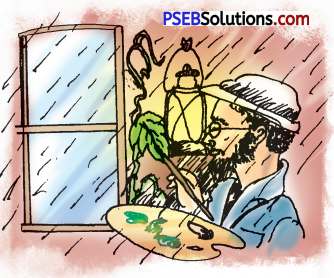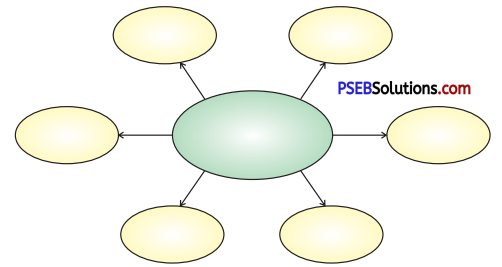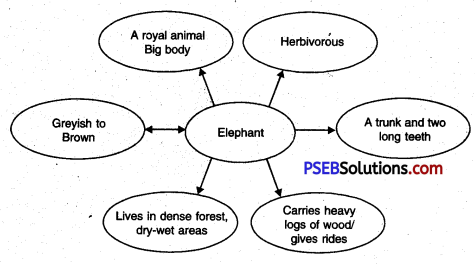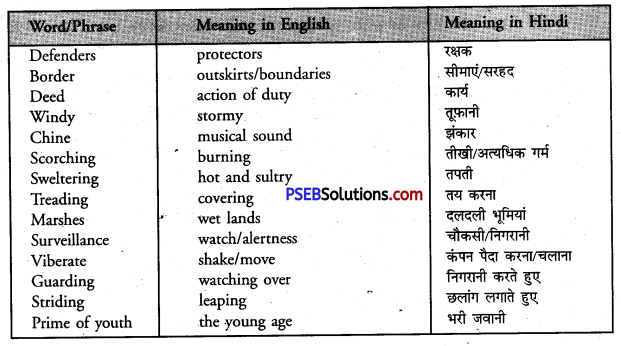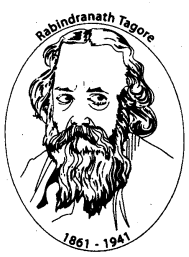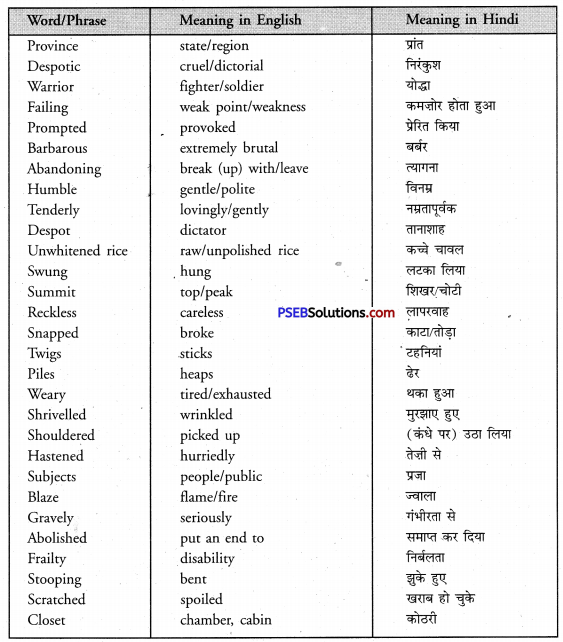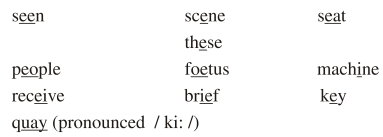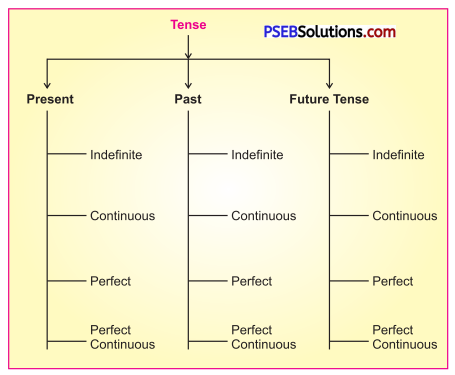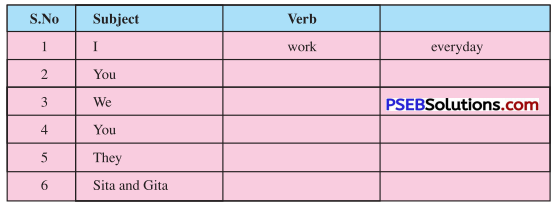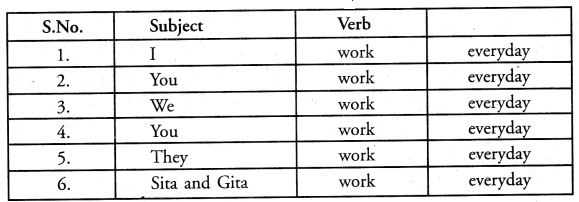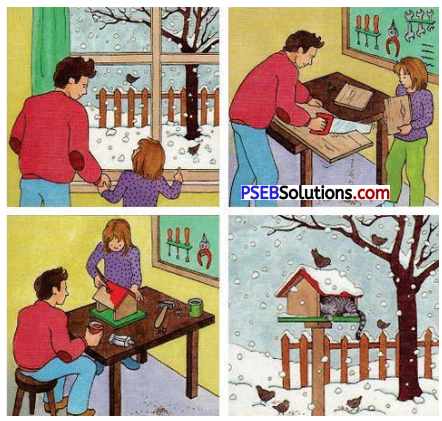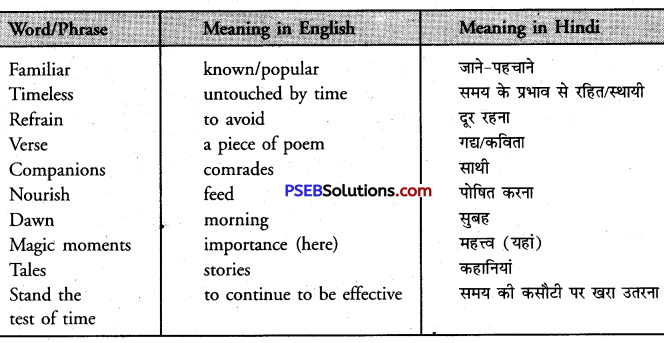Punjab State Board PSEB 9th Class English Book Solutions English Main Course Book Chapter 2 Plants also Breathe and Feel Textbook Exercise Questions and Answers.
Class 9th English Main Course Book Chapter 2 Plants also Breathe and Feel Question Answers
Plants also Breathe and Feel Class 9 Questions and Answers
Answer the following questions in your own words:
Question 1.
What was the event that surprised the world ?
(वह कौन-सी घटना थी जिसने सारे संसार को चकित कर दिया था ?)
Answer.
J.C. Bose had invented an instrument that could measure the growth of plants. He also proved that plants have hearts and can feel. He proved that plants can see. They can sense that a stranger is coming towards them. It was this discovery that surprised the world.
जे० सी० बोस ने एक ऐसे यन्त्र का आविष्कार किया था जो पौधों की वृद्धि को माप सकता था। उसने यह भी सिद्ध कर दिया कि पौधों का दिल होता है और वे महसूस कर सकते हैं। उसने सिद्ध कर दिया कि पौधे देख सकते हैं। वे भांप जाते हैं कि कोई अजनबी उनकी तरफ़ आ रहा है। यही खोज थी जिसने संसार को चकित कर दिया।
![]()
Question 2.
Name the instrument made by Jagdish Chandra Bose.
(जगदीश चन्द्र बोस द्वारा बनाए गए उपकरण का नाम बताएं।)
Answer.
Crescograph.
(क्रेस्कोग्राफ।)
Question 3.
What could the instrument measure ?
(यह उपकरण क्या माप सकता था ?)
Answer.
It could measure the growth of plants.
यह पौधों की वृद्धि को माप सकता था।
Question 4.
What was India known for in the nineteenth century ?
(उन्नीसवीं शताब्दी में भारत किस बात के लिए प्रसिद्ध था ?)
Answer.
India was known for its achievements in arts, literature and philosophy.
भारत कला, साहित्य और दर्शन-शास्त्र में अपनी प्राप्तियों के लिए प्रसिद्ध था।
Question 5.
Where did Bose go for higher studies ?
(उच्च शिक्षा प्राप्त करने के लिए बोस कहाँ गया ?)
Answer.
He went to England.
(वह इंग्लैंड गया।)
Question 6.
What did he have to struggle for ?
(उसे किस बात के लिए संघर्ष करना पड़ा ?)
Answer.
Bose worked as a Professor of Physics in Kolkata. But he was given only half of what was paid to a European Professor. Bose protested against it. In the end, he was given his due.
बोस कोलकाता में भौतिक विज्ञान के एक प्राध्यापक के रूप में काम करता था। परन्तु उसे उससे आधा वेतन मिलता था जितना एक यूरोपियन प्रोफेसर को दिया जाता था। बोस ने इसका विरोध किया। अन्त में उसे उसका अधिकार दे दिया गया।
![]()
Question 7.
What can plants feel ?
(पौधे क्या अनुभव कर सकते हैं ?)
Answer.
Plants can feel like human beings. They can feel tired, sad or happy.
पौधे मनुष्यों की तरह महसूस कर सकते हैं। वे थकान, उदासी या प्रसन्नता महसूस कर सकते हैं।
Question 8.
How can one be glorious ?
(व्यक्ति किस तरह यशस्वी बन सकता है ?)
Answer.
One can be glorious through one’s noble actions and hard work. Glory comes through action, not idleness.
व्यक्ति अपने अच्छे कामों और कठिन परिश्रम के द्वारा यशस्वी बन सकता है। यश क्रिया से प्राप्त होता है, निकम्मेपन से नहीं।
Write short notes on the following:
(निम्नलिखित पर नोट लिखिए)
1. Uses of crescograph
2. Jagdish Chandra Bose’s contribution to science
3. Jagdish Chandra Bose’s love for his country.
Answer.
1. Crescograph is a wonderful instrument. It can record the growth of plants. It shows how plants react to such things as light, noise and manures. It can show that plants feel like human beings. A crescograph can show that plants have a keen sight.
क्रेस्कोग्राफ एक अद्भुत यन्त्र है। यह पौधों की वृद्धि को माप सकता है। यह दिखाता है कि पौधे प्रकाश, शोर और खादों जैसी चीजों के प्रति कैसी प्रतिक्रिया करते हैं। यह दिखा सकता है कि पौधे मानव-जीवों की भांति महसूस करते हैं। एक क्रेस्कोग्राफ दिखा सकता है कि पौधों की नज़र तेज़ होती है।
2. J. C. Bose was a great scientist. He was interested in animal and plant life. He proved that all living things and lifeless objects behaved in the same way. He invented a wonderful instrument. It was called crescograph. With this instrument, he proved that plants can feel like human beings.
जे० सी० बोस एक महान वैज्ञानिक था। वह पशु और वनस्पति जीवन में रुचि रखता था। उसने सिद्ध कर दिया कि सभी जीव और निर्जीव चीजें एक ही तरह से व्यवहार करती हैं। उसने एक अद्भुत यन्त्र का आविष्कार किया। इसका नाम क्रेस्कोग्राफ था। इस यन्त्र के साथ उसने सिद्ध कर दिया कि पौधे मनुष्यों की भांति महसूस कर सकते हैं।
![]()
3. J. C. Bose was a great patriot. He was proud of his country. He was proud of India’s great past. And he had faith in the present generation also. He had faith in the intelligence of his countrymen. He was certain that they could do great things as their ancestors had done in the past.
जे० सी० बोस एक महान् देशभक्त था। उसे अपने देश पर गर्व था। उसे भारत के महान् अतीत पर गर्व था। तथा उसे वर्तमान पीढ़ी पर भी विश्वास था। उसे अपने देशवासियों की बुद्धिमानी पर विश्वास था। उसे विश्वास था कि वे महान् काम कर सकते थे जैसा कि उनके पूर्वज अतीत में किया करते थे।
Textual Vocabulary & Grammar
Question 1.
Match the persons listed in column A with their professions in column B :
Answer:
1. inventor — a person who makes things that did not exist before.
2. professor — a person who teaches in a college or a university.
3. artist — a person who makes things of art.
4. philosopher — a person who has a particular set of beliefs and ideas and is a lover of knowledge.
5. scientist — a person who does research in the field of science.
6. discoverer — a person who finds things that existed before.
7. follower — a person who supports someone else’s ideas and beliefs.
8. rebel — a person who fights against law.
9. writer — a person who writes books on various subjects.
Fill in the blanks with the words given in the box :
battle; cave; struggle; succeeded; reach; despair; defeated
Robert Bruce fought bravely but was ……….. He was hiding in a ………… and was lying in ………… He had been defeated many times. He was thinking of giving up the ………. On one of the walls of the cave, he noticed a spider trying to ………… its web. Eight times it fell down but ………. in the ninth attempt. On seeing this, Bruce also took heart again. He fought another …………. with his enemy and freed his country.
Answer:
defeated, cave, despair, struggle, reach, succeeded, battle.
Fill in the blanks with the words given in the box :
pleased; job; lying; threw; attention; disappointed; vacancy; seek; visited.
Once a smart-looking young man ………….. a business firm to …………. employment. The manager, though pleased, said, “There is no …………. in the firm right now.” As the man was ………….., he turned to leave. At the doorway, he saw a pin ………….. on the floor. He picked it up and …………. it into the dustbin. The manager was ……… with his habit of paying …………. to such small matters. He at once called him back and gave him a ………….
Answer:
visited, seek, vacancy, disappointed, lying, threw, pleased, attention, job.
State whether the words in italics are ‘adjectives’ or ‘nouns’:
1. She possesses a sound health. adjective
I hear a low sound coming from this side. noun
2. This ball is round in shape. adjective
I finished my fourth round only half a minute ago. noun
3. This colour is fast. adjective
I observe a fast every Monday. noun
4. She is wearing a very light dress. adjective
Please switch on the light. noun
5. He is a poor judge of people. adjective
Do not laugh at the poor and the needy. noun
Fill in the blanks by using the following conjunctions :
unless, while, although, when
1. We cannot get off the bus ………….. it slows down.
2. Make hay …………. the sun shines.
3. Mice will play …………… the cat is away.
4. He didn’t come to the party …………… we invited him.
5. ………….. he worked hard, he couldn’t succeed.
6. You cannot succeed ……………. you work hard.
7. Strike …………… the iron is hot.
8. The boat will sink …………… we bailout.
9. …………… the sun was shining, it wasn’t very warm.
10. The kidnappers told him that he would be killed …………… he cooperated.
Answer:
1. unless
2. while
3. when
4. although
5. Although
6. unless
7. while
8. when
9. Although
10. unless.
![]()
Fill in the blanks with the following determiners :
few, a few, the few, little, a little, the little
1. Asha said, “There is ………….. milk at home, so I cannot make tea for you.” Shiela said that she had ……………. milk in her kitchen with which they could make tea for both of them. When she went to her kitchen, she saw that her son had drunk ……………. milk she had.
Answer:
little, a little, the little.
2. The teacher noticed ………….. mistakes in Arjun’s assignment. He was surprised because Arjun usually made ……………. mistakes. The teacher corrected …. mistakes he had made.
Answer:
a few, few, the few.
Pronunciation Practice
Note the mismatch between sounds and spellings in the following words and say them aloud:
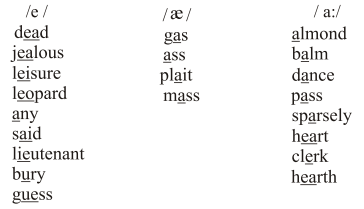
Extended Reading and Creative Writing
1. Make a list of the qualities of a gentleman. Discuss these with your classmate
2. How, according to you, should a teacher develop the personality of a child? Write your answer in 8-10 lines.
Use of textual words / phrases
1. Unique — Our Principal has a unique way of dealing with naughty students.
2. Approaching (adj) — Beware of the approaching danger.
3. Approaching (v) — The time is approaching when we will have to leave.
4. Amazed — I was amazed to see the jewellery she wore.
5. Victorious — The nation welcomed the victorious team home.
6. Temporary — She moved into some temporary accommodation.
7. Rebel — The rebels were dismissed from service.
8. Give up — You ought to give up smoking.
9. Stimulus — Praise always acts as a stimulus for little children.
10. Capable — Only human beings are capable of reason.
11. Glory — The glory of great men lasts for ever.
12. Undying — We have undying faith in God.
Objective Type Questions
Answer the following in one word/phrase / sentence :
Question 1.
Name the writer of the chapter.
Answer.
It is written by an anonymous writer.
Question 2.
What does the chapter talk about ?
Answer.
About plants.
Question 3.
According to the writer, what do the plants do like humans ?
Answer.
They also breathe and feel like them.
Question 4.
Who was Jagdish Chandra Bose ?
Answer.
He was a famous Indian scientist.
Question 5.
Where did Bose go for higher studies ?
Answer.
To England.
Question 6.
How was Bose as a man ?
Answer.
He was a man of principles.
![]()
Question 7.
Can plants feel tiredness, happiness, etc. ?
Answer.
Yes, they do have feelings like humans.
Question 8.
What machine did Bose build to prove his theory?
Answer.
It was Crescograph.
Question 9.
Where did he display his machine ?
Answer:
At the Paris Science Congress.
Question 10.
What confidence did he have about Indians ?
Answer:
He said that they were capable of great discoveries.
Complete the following :
1. Bose studied ……………….. at Calcutta University.
2. He went to …. for further studies.
3. Bose showed that the plants could also ……………. and
4. Bose found similarities between ………………. and non-living things.
5. People …………………. him when he first came out with his theory…….. was the name of the machine he had built.
Answer:
1. physics
2. England
3. breathe, feel
4. living
5. laughed at
6. Crescograph.
Write True or False against each statement :
1. Sir Jagdish Chandra Bose was born in England.
2. He received a salary equal to what a European got.
3. Bose was successful in proving his theory to the world.
4. Bose was interested in the plant life right from his boyhood.
5. He displayed his Crescograph at the English Convention.
6. He had a deep faith in the capability of all Indians.
Answer:
1. False
2. False
3. True
4. True
5. False
6. True
Choose the correct option for each of the following :
Question 1.
Bose graduated from ……………… university.
(a) Cambridge
(b) Oxford
(c) Paris
(d) Calcutta.
Answer:
(a) Cambridge
Question 2.
Bose was appointed as a professor of …………….
(a) Chemisty
(b) Physics
(c) General Science
(d) Higher Sciences.
Answer:
(b) Physics
Question 3.
Bose was interested in the plant life since …..
(a) his college
(b) his childhood.
(c) his boyhood
(d) his graduation.
Answer:
(c) his boyhood
![]()
Question 4.
According to Bose, plants could feel
(a) tiredness
(b) depression
(c) happiness
(d) all the above.
Answer:
(d) all the above.
Plants also Breathe and Feel Summary in English
Plants also Breathe and Feel Introduction:
Sir Jagdish Chandra Bose was a well-known Indian scientist. He studied animal and plant life. He proved that plants could feel and hear like human beings. To prove this, he designed and built a machine called ‘crescograph’. Scientists at the Paris Science Congress of 1900 were amazed to see this wonderful machine. Jagdish Chandra Bose made a name for himself and his country in the scientific world.
Plants also Breathe and Feel Summary in English:
Sir Jagdish Chandra Bose was a well-known Indian scientist. He was born in 1858 in a village in Bengal. He studied Physics at Calcutta (Kolkata) University. Then he went to England for further studies. He graduated from Cambridge and returned to India. He was appointed Professor of Physics in Presidency College, Calcutta (Kolkata).
In those days of British rule, an Indian usually received two-thirds of the salary paid to a European Professor. Jagdish Chandra Bose was given only half of a European Professor’s salary as his appointment was a temporary one. Sir J.C. Bose was a man of principles. He could not bear this injustice. He refused to touch any part of his salary for three years. In the three-year struggle between Bose and the government, Bose was victorious.
J. C. Bose now began his experiments. His work made him famous all over the world. He had been interested in animal and plant life since boyhood. He noticed that his wireless receiver showed signs of ‘tiredness’ after it had been in use for some time. But it regained its power after “rest”.
Jagdish Chandra Bose realised that there was a similarity in the behaviour of living and non-living things. He said that plants and animals had a life of their own and could become ‘tired’, ‘depressed or ‘happy’. People laughed at him. They did not take him seriously.
In order to prove that he was right, Jagdish Chandra Bose built a machine called ‘crescograph’. This machine proved that plants had hearts and were capable of feeling. It also indicated that plants had a keen sight. They reacted to rays of light and wireless waves. When J. C. Bose displayed this machine at the Paris Science Congress of 1900, the scientists were greatly amazed. Thus, through his invention, Bose made a name for himself and his country in the scientific world.
![]()
Plants also Breathe and Feel Summary in Hindi
Plants also Breathe and Feel Introduction:
सर जगदीश चन्द्र बोस एक प्रसिद्ध भारतीय वैज्ञानिक था। उसने पशु तथा वनस्पति जीवन का अध्ययन किया। उसने सिद्ध किया कि मनुष्यों की भान्ति पौधे भी अनुभव कर सकते हैं तथा सुन सकते हैं। इसे सिद्ध करने के लिए उसने ‘ऊस्कोग्राफ’ नामक मशीन का निर्माण किया। वर्ष 1900 के पैरिस विज्ञान सम्मेलन में शामिल हुए वैज्ञानिक इस शानदार मशीन को देखकर चकित रह गए। जगदीश चन्द्र बोस ने अपने आविष्कार के द्वारा विज्ञान जगत में अपना तथा अपने देश का नाम उज्जवल किया।
Plants also Breathe and Feel Summary in Hindi:
पाठ का विस्तृत सार सर जगदीश चन्द्र बोस एक महान् और प्रसिद्ध भारतीय वैज्ञानिक था। उसका जन्म 1858 ई० में बंगाल के एक गांव में हुआ था। उसने कलकत्ता (कोलकाता) विश्वविद्यालय में भौतिकी का अध्ययन किया। फिर वह उच्च शिक्षा के लिए इंग्लैण्ड चला गया। उसने कैम्ब्रिज से स्नातक की डिग्री प्राप्त की और भारत लौट आया। उसे कलकत्ता (कोलकाता) के प्रेसिडेन्सी कॉलेज में भौतिकी का प्राध्यापक नियुक्त किया गया। अंग्रेजी शासन के उन दिनों में एक भारतीय व्यक्ति को एक यूरोपियन प्राध्यापक के वेतन की अपेक्षा दोतिहाई वेतन मिलता था। जगदीश चन्द्र बोस को एक यूरोपियन प्राध्यापक के वेतन की अपेक्षा केवल आधा वेतन दिया गया था क्योंकि उसकी नियुक्ति अस्थायी तौर पर थी। सर जगदीश चन्द्र बोस एक सिद्धान्तवादी व्यक्ति था। वह इस अन्याय को सहन नहीं कर सकता था। उसने तीन वर्ष तक अपने वेतन को छुआ तक नहीं। आखिर सरकार तथा बोस के मध्य इस तीन-वर्षीय संघर्ष में बोस की विजय हुई।
जे० सी० बोस ने अब वह कार्य करना प्रारम्भ किया जिसके कारण उसकी ख्याति सारे विश्व में फैल गई। अपने लड़कपन से ही उसे पशुओं और पौधों के जीवन में रुचि थी। उसने देखा कि उसका वायरलेस रिसीवर कुछ समय चलने के पश्चात् ‘थकावट’ के लक्षण दर्शाता था, लेकिन थोड़े ‘विश्राम’ के बाद वह पुनः अपनी शक्ति प्राप्त कर लेता था। इससे बोस के विचारों को प्रेरणा मिली जिससे अनेक आविष्कारों का जन्म हुआ।
जगदीश चन्द्र बोस ने अनुभव किया कि निर्जीव तथा सजीव चीज़ों के व्यवहार में समानता होती है। उसने कहा कि पौधों और पशुओं का अपना जीवन होता है तथा वे ‘थक’ सकते हैं, ‘निराश’ हो सकते हैं या ‘प्रसन्न’ हो सकते हैं। लोगों ने बोस की इन बातों का मजाक उड़ाया और उसे गम्भीरता से न लिया।
स्वयं को सही सिद्ध करने के लिए जगदीश चन्द्र बोस ने ‘क्रेस्कोग्राफ’ नामक एक मशीन बनाई। इस मशीन ने सिद्ध कर दिया कि पौधों का हृदय होता है और वे अनुभव कर सकते हैं। इसने यह भी दिखलाया कि पौधों की दृष्टि और उनकी चेतना-शक्ति बहुत तेज़ होती है और वे प्रकाश की किरणों और वायरलैस तरंगों के प्रति सचेत होते हैं। जब जे० सी० बोस ने इस मशीन का प्रदर्शन 1900 में पैरिस के विज्ञान सम्मेलन में किया, तो वैज्ञानिक आश्चर्यचकित रह गए। इस तरह अपने आविष्कार के द्वारा बोस ने वैज्ञानिक संसार में अपना और अपने देश का नाम उज्जवल किया।
जगदीश चन्द्र बोस को भारतीयों की बुद्धिमता पर गहरा विश्वास था। उसका दृढ़ विश्वास था कि भारतीय लोग अपने पूर्वजों की भान्ति महान् आविष्कार कर सकते हैं। उसका यह विश्वास भी था कि एक अकेले व्यक्ति के लिए कोई प्रसन्नता नहीं हो सकती जब तक वह प्रसन्नता सब के लिए न हो।
![]()
Plants also Breathe and Feel Translation in Hindi
(Page 8) All of us know …………… the scientific world.
कठिन शब्दार्थ-1. event-घटना ; 2. surprised-चकित कर दिया ; 3. scientificवैज्ञानिक ; 4. unique-अनोखा ; 5. instrument-उपकरण ; 6. measure-नापना ; 7. sight-दृष्टि ; 8. sense-चेतना-शक्ति ; 9. stranger-अजनबी ; 10. inventor-आविष्कारक ; 11. literature-साहित्य ; 12. philosophy-दर्शन-शास्त्र ; 13. science-विज्ञान ; 14. progressed—प्रगति की ; 15. inventionआविष्कार।
Text
[All of us know that plants have life, but how many of us know that they have hearts, can fell and see ? This extract tells us something about the scientist who made this dramatic discovery.] It was an event that surprised the scientific world. It was an undreamt of thing. Here was a man who had built a unique instrument an instrument that could measure the growth of plants. Here was a man who had proved with this wonderful machine that plants have hearts and can feel. The machine showed that plants have sight and a sense which tells them that a stranger is approaching.
“Your instrument is a wonderful thing,”said the great men who had come to the Paris Congress of Science, 1900. They were amazed as the inventor showed them how to use the machine. “What do you call this instrument ?“ they asked. “A crescograph,” replied Jagdish Chancira Bose, the great scientist, who had built this wonderful machine.
अनुवाद
[हम सभी जानते हैं कि पौधों में जीवन होता है, परन्तु हम में से कितने लोग जानते हैं कि पौधों में दिल भी होता है, वे भी महसूस कर सकते हैं और देख सकते हैं ? यह अंश हमें उस वैज्ञानिक के बारे में कुछ बताता है जिसने यह नाटकीय खोज की।] यह एक ऐसी घटना थी जिसने वैज्ञानिक जगत को आश्चर्यचकित कर दिया। यह एक ऐसी बात थी जिसे स्वप्न में भी सोचा नहीं जा सकता था। यहां एक ऐसा व्यक्ति था जिसने एक अद्वितीय उपकरण का निर्माण किया एक ऐसा उपकरण जो पौधों की वृद्धि को माप सकता था। यहाँ एक ऐसा व्यक्ति था जिसने अपनी अद्भुत मशीन के द्वारा यह सिद्ध कर दिया कि पौधों के भी दिल होते हैं और वे अनुभव कर सकते हैं।
इस मशीन ने यह दिखा दिया कि पौधों की दृष्टि होती है और उनके पास ऐसी चेतना-शक्ति होती है जो उन्हें बता देती है कि कोई अजनबी नज़दीक आ रहा है।”आपका उपकरण एक शानदार चीज़ है,” उन महान् पुरुषों ने कहा जो 1900 के विज्ञान-सम्बन्धी पैरिस सम्मेलन में शामिल हुए थे। उन्हें आश्चर्य हुआ जब आविष्कारक ने उन्हें बताया कि मशीन को कैसे प्रयोग किया जाता है। “आप इस उपकरण को क्या कहते हैं ?” उन्होंने पूछा। “एक क्रेस्कोग्राफ,” जगदीश चन्द्र बोस ने उत्तर दिया, वह महान् वैज्ञानिक जिसने इस शानदार मशीन का निर्माण किया था। “और इसका निर्माण कहां हुआ था ? ने पूछा।
उत्तर प्राप्त हुआ-“भारत में।” इस उत्तर ने और ज्यादा हैरानी पैदा कर दी। कला, साहित्य तथा दर्शन के क्षेत्र में अपनी महानता के लिए प्रसिद्ध था। परन्तु विज्ञान के क्षेत्र में इसने कोई विशेष प्रगति नहीं की थी। सर जगदीश चन्द्र बोस ने अपने आविष्कार से वैज्ञानिक जगत में अपना और अपने ेश का नाम ऊंचा किया।
(Page 9) Bose was born …….. of science
कठिन शब्दार्थ-1. appointed—नियुक्त किया ; 2. struggle-संघर्ष ; 3. governmentसरकार ; 4. victorious—विजयी ; 5. usually-साधारणतया ; 6. received—प्राप्त किया ; 7. salaryवेतन ; 8. race—जाति ; 9. discoveries-आविष्कार, खोजें ; 10. faithful-वफ़ादार ; 11. followersशिष्य ; 12. rebel-विद्रोही, बाग़ी ; 13. refused—इन्कार किया ; 14. self-respect—आत्म-सम्मान ;19. interested-रुचि होना ; 20. tiredness-थकान ; 21. purpose-उद्देश्य ; 22. branch-शाखा ; 23. separately-अलग से ; 24. detail-विस्तार।
Text
Bose was born in 1858 in a village in Bengal. After studying physics at Calcutta University, he went to England for further studies. He graduated from Cambridge, then returned to India and was appointed Professor of Physics at Presidency College in Calcutta.
A three-year struggle began between Bose and the government, in which he was victorious. An Indian, in those days of British rule, usually received two-thirds of the salary paid to a European professor. Bose’s appointment was a temporary one, so he was given only half therate for a European. Bose was not the man to take this quietly.
He felt that people who did the same amount and same kind of work should be paid the same salary whatever race or nation they belonged to. It is worth remembering that discoveries do not come from the faithful followers and the yes-men of science; they come from the doubters and the rebels. Bose was, by nature, a rebel.
He refused to touch any part of his salary for three years. It was a question of his self-respect and he was not ready to give up his principles. In the end, victory was his. Bose now began the work which has made him famous all over the world. He had, from boyhood, been interested in animal and plant life, and now his work in physics led him back to his old love. He had noticed that his wireless receiver showed signs of ‘tiredness’ after it had been in use for some time, but, in some strange way, got back its power after being ‘rested’. Here was food for thought, the kind of thought from which great discoveries come.
![]()
Until the end of the Middle Ages, the world was looked on as one beautiful unit, created by God. Man believed that everything in the world, from man to rocks and stones, had its place and purpose. The discoveries of Galileo and Newton changed the world picture. Man began to study each branch of science separately with greater detail and there developed several different kinds of sciences. Bose, however, recognised a unity among all these different branches of science.
अनुवाद
बोस का जन्म 1858 में बंगाल के एक गांव में हुआ। कलकत्ता (कोलकाता) विश्वविद्यालय में भौतिकी के अध्ययन के पश्चात् वह आगे की पढ़ाई के लिए इंग्लैण्ड चला गया। उसने कैम्ब्रिज से स्नातक की परीक्षा पास की, फिर भारत लौट आया और कलकत्ता (कोलकाता) के प्रेसिडेन्सी कॉलेज में भौतिकी का प्राध्यापक नियुक्त हो गया। सरकार तथा बोस के मध्य एक तीन-वर्षीय संघर्ष शुरू हो गया जिसमें वह विजयी हुआ। अंग्रेज़ी शासन के उन दिनों में एक भारतीय को यूरोपियन प्राध्यापक के वेतन का दो-तिहाई प्राप्त होता था। बोस की नियुक्ति अस्थायी थी, इसलिए उसे यूरोपियन दर का केवल आधा दिया गया। बोस इसे चुपचाप सहन करने वाला व्यक्ति नहीं था। उसने महसूस किया कि जो लोग एक समान मात्रा में काम करते हैं और एक ही प्रकार का काम करते हैं, उन्हें बराबर वेतन मिलना चाहिए, भले ही वे किसी जाति या राष्ट्र से सम्बन्धित हों। यह बात याद रखने योग्य है कि आविष्कार वफ़ादार अनुयायियों तथा चापलूसवैज्ञानिकों द्वारा नहीं किए जाते; वे शंकालु एवं विद्रोही f वैज्ञानिकों द्वारा ही किए जाते हैं। बोस स्वभाव से ही विद्रोही था।
उसने तीन वर्ष तक अपने वेतन के किसी भी अंश को छूने से इन्कार कर दिया। यह उसके आत्म-सम्मान का प्रश्न था और वह अपने सिद्धान्तों को छोड़ने के लिए तैयार नहीं था। अन्त में विजय उसी की हुई। बोस ने अब वह काम आरम्भ किया जिसने उसे विश्व भर में प्रसिद्ध कर दिया है। वह लड़कपन से ही जीवों और पौधों के जीवन में रुचि रखता था और अब भौतिक शास्त्र में होने वाले उसके काम ने उसकी पुरानी रुचि को फिर से जगा दिया। उसने देखा कि उसके वायरलैस रिसीवर को ‘थकावट’ महसूस होने लगती थी जब इसे कुछ समय तक चलाए रखा जाता था, किन्तु विचित्र ढंग से यह ‘आराम’ करने के बाद अपनी पहले वाली शक्ति को फिर से प्राप्त कर लेता था। यहां सोचने की एक खुराक थी – ऐसी खुराक जिससे महान्
आविष्कार प्राप्त होते हैं। मध्यकाल के अन्त तक संसार को एक सुन्दर इकाई के रूप में देखा जाता था जिसकी रचना ईश्वर ने की। मनुष्य का विश्वास था कि विश्व की प्रत्येक वस्तु, इन्सान से लेकर चट्टानों और पत्थरों तक, अपना निजी स्थान और उद्देश्य रखती है। गैलिलियो तथा न्यूटन के आविष्कारों ने विश्व की तस्वीर को बदल दिया। मनुष्य ने विज्ञान की प्रत्येक शाखा का अलग-अलग तौर पर विस्तृत अध्ययन करना शुरू कर दिया और इस तरह कई प्रकार के विज्ञानों का विकास हुआ। किन्तु बोस ने विज्ञान की न सभी विभिन्न शाखाओं के बीच एकता को पहचाना।
(Page 10) He realized that …….. faith in the future.
कठिन शब्दार्थ-
1. realized-अहसास हुआ ; 2. similarity-समानता ; 3. behaviourव्यवहार ; 4. lifeless-निर्जीव ; 5. suggested—सुझाव दिया ; 6. kingdom-राज्य ; 7. depressed-उदास ; 8. happy-प्रसन्न ; 9. seriously-गम्भीरता से ; 10. proved—सिद्ध किया ; 11. built-बनाया, निर्माण किया; 12. maximum-अधिकतम ; 13. exactness-सटीकता ; 14. amazing-आश्चर्यजनक ; 15. instrument-उपकरण ; 16. manures-खादें ; 17. indicate-संकेत करना ; 18. keen—तीक्ष्ण, पैनी ; 19. approach-निकट पहुँचना ; 20. scientist-वैज्ञानिक ; 21. complete-पूर्ण, पूरा ; 22. mentionज़िक्र, चर्चा ; 23. concern-चिन्ता ; 24. faith—विश्वास ; 25. intelligence-बुद्धिमत्ता ; 26. countrymenदेशवासी ; 27. ancestors-पूर्वज ; 28. address-सम्बोधन, भाषण ; 29. convocation-दीक्षांत समारोह ; 30. glory-गौरव ; 31. idleness-निकम्मापन।
Text
He realized that there was a similarity in the behaviour of lifeless and living things. It was, however, not easy to convince others. People hold on to their old beliefs and do not like to change them. Bose suggested that the animal, vegetable and mineral kingdoms were one and had a great deal in common. He said that plants and metals had a life of their own and could become tired’, depressed’ or happy’. People laughed at him. They did not take him seriously.
Bose knew he was right and he proved it. To begin with, he designed and built a machine which recorded his findings- with maximum exactness. This was the ‘crescograph’, the amazing instrument which records the growth of plants. It magnifies the movement of plant tissues ten thousand times and can record the reaction of plants to manures, noise and other stimuli. The crescograph proved that Bose had not been wrong. It showed that plants have hearts and are capable of feeling. The crescograph indicated that plants have a keen sight and react to rays of light and wireless waves. The machine proved that plants have a special sense which tells them of the approach of a stranger.
![]()
The story of this great scientist will not be complete without some mention of his concern for India and her people. He had a deep faith in the intelligence of his countrymen. Bose was certain that they were as capable of doing great things today as their ancestors had done in the past. In an address at a convocation of the University of Mysore in November 1927, Sir Jagdish Chandra Bose spoke about India’s glory in the past and declared that it was action and not idleness that was responsible for that glory. He believed that there could be, no happiness for a single person unless it had been won for all. And this great scientist wanted his countrymen to have undying hope and faith in the future.
अनुवाद
उसे एहसास हुआ कि सजीव तथा निर्जीव वस्तुओं के व्यवहार में एक समानता होती है। फिर भी, दूसरों को सहमत करवाना आसान नहीं था। लोग अपने पुराने विश्वासों से चिपके रहते हैं और उन्हें बदलना नहीं चाहते हैं। बोस ने सुझाव दिया कि प्राणी, वनस्पति और खनिज जगत सब एक हैं और उनमें बहुत कुछ सांझा है। उसने कहा कि पौधों और धातुओं का अपना एक अलग जीवन होता है तथा वे ‘थकावट’, ‘उदासी’, या ‘प्रसन्नता’ महसूस कर सकते हैं। लोग उस पर हंस देते। उन्होंने उसकी बातों को गम्भीरता से नहीं लिया।
बोस जानता था कि वह सही है और उसने यह सिद्ध कर दिया। शुरू में उसने ऐसी मशीन का निर्माण किया जो उसकी खोजों को अधिकतम सटीकता से रिकार्ड कर सकती थी। यह ‘क्रेस्कोग्राफ’ था, एक आश्चर्यजनक उपकरण, जो पौधों की वृद्धि को रिकार्ड करता है। वह ौधों के तन्तुओं की गति को दस हज़ार गुणा बढ़ा कर बतलाता है तथा खादों, शोर और दूसरे उत्प्रेरक पदार्थों के प्रति पौधों की प्रतिक्रिया को रिकार्ड कर सकता है। क्रेस्कोग्राफ ने सिद्ध कर दिया कि बोस गलत नहीं था। इसने दिखा दिया कि पौधों का हृदय होता है और वे अनुभव करने की क्षमता रखते हैं। क्रेस्कोग्राफ ने दिखलाया कि पौधों की दृष्टि तेज़ होती है और वे प्रकाश की किरणों और बेतार तंरगों के प्रति प्रतिक्रिया करते हैं।
इस मशीन ने सिद्ध कर दिया कि पौधों में एक विशेष चेतना शक्ति होती है जो उन्हें निकट आते हुए किसी अजनबी के बारे में बता देती है। इस महान् वैज्ञानिक की कहानी उसकी भारत के प्रति और भारत के लोगों के प्रति चिन्ता की चर्चा किए बिना अधूरी रहेगी। उसे अपने देशवासियों की बुद्धिमत्ता पर पूरा विश्वास था। बोस को विश्वास था कि वे महान् कार्य करने में आज उतने ही समर्थ हैं जितने पुरातन काल में उनके पूर्वज हुआ करते थे। नवम्बर, 1927 में मैसूर विश्वविद्यालय के दीक्षान्त समारोह को सम्बोधित करते हुए जगदीश चन्द्र बोस ने भारत की प्राचीन ख्याति का वर्णन किया और घोषणा की कि उस ख्याति का
![]()
ज़िम्मेदार कर्म था न कि आलस्य। उसका विश्वास था कि जब तक प्रसन्नता सबके लिए जीती नहीं जाती, एक अकेला व्यक्ति प्रसन्न नहीं रह सकता था। और यह महान् वैज्ञानिक चाहता था कि उसके देशवासियों में भविष्य के लिए अनन्त आशा और विश्वास भरा रहे।
English Main Course Book Class 9 Solutions PSEB Prose

